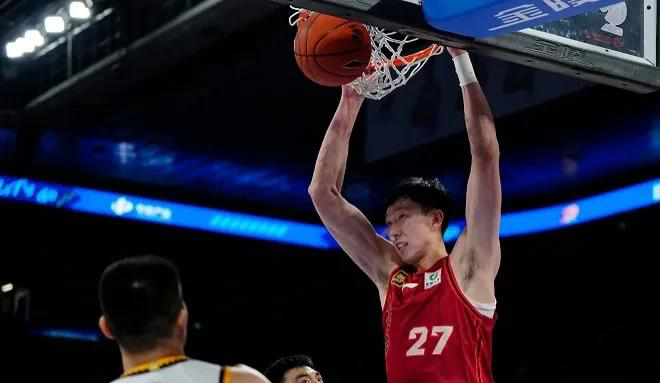Beijing Shougang played with ease at home, and Zhou Qi's performance after his comeback gave fans hope. However, there were many untold stories behind his absence from the game due to influenza, which made us rethink the issue of athlete health management.
Beijing Shougang completely dominated the game, and Zhejiang Chouzhou Bank seemed powerless without their three main players. The entire game rhythm was firmly controlled by Shougang.
Zhou Qi's performance in this game was quite outstanding, with a very high shooting percentage. He made 8 out of 12 shots, which is rare efficiency for a center position.
However, Zhou Qi's rebounding statistics were indeed low, grabbing only 4 rebounds throughout the game, which is somewhat different from his previous performances.
Coach Xu Limin said after the game that Zhou Qi's current state may only be 30 to 40 percent, which is surprising because it's not visible from his on-court performance.
Beijing Shougang's overall strength is indeed strong, and even if Zhou Qi's condition has not fully recovered, the team can still easily win the game.
This victory is significant for Shougang as it solidifies their position on the leaderboard.
Although Zhejiang lost the game, their young players' performances are commendable. They showed great potential despite the absence of their main players.

Shougang's defensive strategy was very successful in this game, limiting Zhejiang's offensive points and keeping their scoring at a low level.
Zhou Qi missed six games due to influenza, which raised many fans' doubts at the time, but the actual situation is much more complicated than everyone imagined.
As a key player for the national team, Zhou Qi faces many restrictions in medication use, unable to take many common cold medicines casually.
These restrictions aim to avoid issues during random urine tests, so he could only use some basic drugs for treatment, resulting in a longer recovery time than usual.
When Coach Xu Limin explained this, his tone carried some helplessness, as this is indeed a difficult choice.
Zhou Qi himself actually wanted to return to the court as soon as possible, but for long-term considerations, he had to accept such a treatment plan.
This incident also sparked discussions about the athlete medication management system, questioning whether more flexible handling methods are needed under special circumstances.
After understanding the truth, fans' attitudes towards Zhou Qi have changed significantly, and previous doubts have gradually disappeared.

This experience also made Zhou Qi pay more attention to his physical management, as health is the most important asset for athletes.
The Chinese men's basketball team currently has limited options in the frontcourt, with few players other than Zhou Qi and Hu Jinqiu able to gain an advantage in international competitions.
Wang Zhelin has been absent from the national team roster for a long time, which surprises many, considering his decent performance in the CBA league.
The national team is currently facing an injury wave, with multiple key players recovering from injuries, making team selection even more challenging.
The upcoming China-Japan match is crucial for the Chinese men's basketball team, as they lost to their opponent in the last encounter.
Zhou Qi's recovery is vital for the national team, especially in the frontcourt where his defensive abilities are irreplaceable by other players.
The coaching staff is closely monitoring all players' recovery conditions, hoping to present the strongest lineup before the key matches.
The Chinese men's basketball training system also needs strengthening to cultivate more excellent frontcourt players instead of always relying on a few familiar faces.
This match against Japan could be a turning point, important for both the team and Zhou Qi personally.